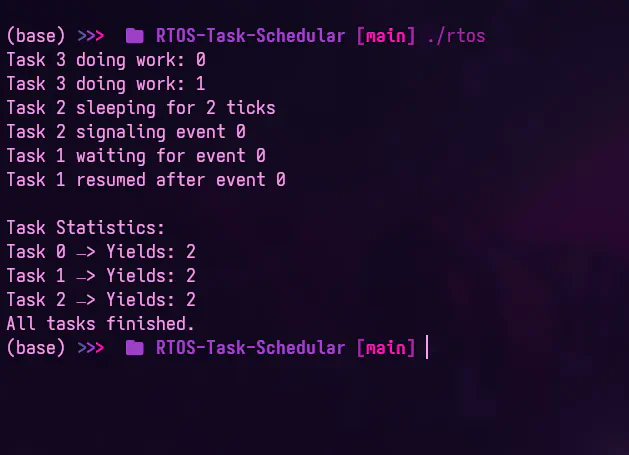RTOS-like Task Schedular
 RTOS-like Task Schedular
RTOS-like Task SchedularRTOS-like Task Scheduler in C (setjmp/longjmp)
This is a cooperative, RTOS-style task scheduler written in pure C — no OS, no external libraries, no hardware dependencies. It simulates key features of a real embedded OS: context switching, priority-based scheduling, delays, and event-driven task synchronization.
Key Concepts
- setjmp/longjmp – used to simulate context switching between tasks
- Task Control Blocks – holds state like priority, delay, context, etc.
- Cooperative Scheduling – tasks voluntarily yield or wait
- Priority Scheduling – higher priority tasks run before lower ones
- Task Delays – simulate sleeping for N ticks
- Event Signaling – tasks can wait for and signal events (e.g. semaphores)
Features Implemented
| Feature | Description |
|---|---|
| Context Switching | Uses setjmp/longjmp to switch between task functions |
| Round-Robin Scheduling | Selects tasks in a loop (if equal priority) |
| Priority-Based Exec | Higher priority tasks run first |
Delays (sleep) | Simulates task blocking for n ticks |
| Yielding | Tasks manually yield control |
| Event Wait/Signal | Tasks can wait for and signal specific events |
| Yield Stats | Track how often each task yields |
Project Structure
rtos_scheduler/
├── include/
│ ├── task.h # Task structures and API
│ └── scheduler.h # Scheduler API
├── src/
│ ├── task.c # Task logic (create, yield, sleep, event)
│ └── scheduler.c # Main scheduling logic
├── test/
│ └── test_tasks.c # Sample tasks (demo main program)
├── Makefile # Easy build system
└── README.md # This file!
Build & Run
Requirements:
- Any C compiler (
gccrecommended) - Make (optional but convenient)
Compile & Run
make
./rtos
Example Output
Task 3 doing work: 0
Task 3 doing work: 1
Task 2 sleeping for 2 ticks
Task 1 waiting for event 0
Task 3 doing work: 0
Task 3 doing work: 1
Task 2 signaling event 0
Task 1 resumed after event 0
All tasks finished.
Task Statistics:
Task 0 -> Yields: 2
Task 1 -> Yields: 2
Task 2 -> Yields: 2
Potential Extensions
- Stack simulation using heap (
malloc-based context) - CLI-based task injection (dynamic creation)
- Preemptive scheduling simulation via signals/timers
- Logging task traces to a file for analysis
- Resource semaphores and mutex simulation